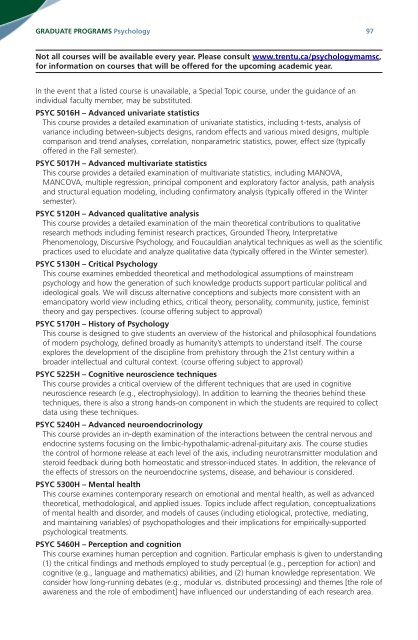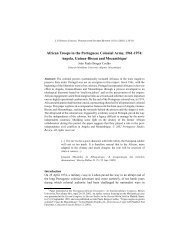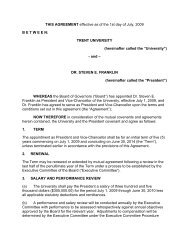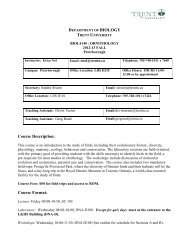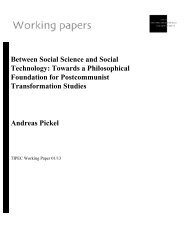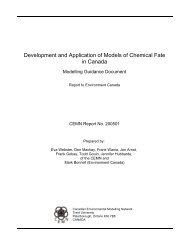Graduate academic calendar 2012 - 2013 - Trent University
Graduate academic calendar 2012 - 2013 - Trent University
Graduate academic calendar 2012 - 2013 - Trent University
You also want an ePaper? Increase the reach of your titles
YUMPU automatically turns print PDFs into web optimized ePapers that Google loves.
GRADUATE PROGRAMS Psychology<br />
97<br />
Not all courses will be available every year. Please consult www.trentu.ca/psychologymamsc,<br />
for information on courses that will be offered for the upcoming <strong>academic</strong> year.<br />
In the event that a listed course is unavailable, a Special Topic course, under the guidance of an<br />
individual faculty member, may be substituted.<br />
PSYC 5016H – Advanced univariate statistics<br />
This course provides a detailed examination of univariate statistics, including t-tests, analysis of<br />
variance including between-subjects designs, random effects and various mixed designs, multiple<br />
comparison and trend analyses, correlation, nonparametric statistics, power, effect size (typically<br />
offered in the Fall semester).<br />
PSYC 5017H – Advanced multivariate statistics<br />
This course provides a detailed examination of multivariate statistics, including MANOVA,<br />
MANCOVA, multiple regression, principal component and exploratory factor analysis, path analysis<br />
and structural equation modeling, including confirmatory analysis (typically offered in the Winter<br />
semester).<br />
PSYC 5120H – Advanced qualitative analysis<br />
This course provides a detailed examination of the main theoretical contributions to qualitative<br />
research methods including feminist research practices, Grounded Theory, Interpretative<br />
Phenomenology, Discursive Psychology, and Foucauldian analytical techniques as well as the scientific<br />
practices used to elucidate and analyze qualitative data (typically offered in the Winter semester).<br />
PSYC 5130H – Critical Psychology<br />
This course examines embedded theoretical and methodological assumptions of mainstream<br />
psychology and how the generation of such knowledge products support particular political and<br />
ideological goals. We will discuss alternative conceptions and subjects more consistent with an<br />
emancipatory world view including ethics, critical theory, personality, community, justice, feminist<br />
theory and gay perspectives. (course offering subject to approval)<br />
PSYC 5170H – History of Psychology<br />
This course is designed to give students an overview of the historical and philosophical foundations<br />
of modern psychology, defined broadly as humanity’s attempts to understand itself. The course<br />
explores the development of the discipline from prehistory through the 21st century within a<br />
broader intellectual and cultural context. (course offering subject to approval)<br />
PSYC 5225H – Cognitive neuroscience techniques<br />
This course provides a critical overview of the different techniques that are used in cognitive<br />
neuroscience research (e.g., electrophysiology). In addition to learning the theories behind these<br />
techniques, there is also a strong hands-on component in which the students are required to collect<br />
data using these techniques.<br />
PSYC 5240H – Advanced neuroendocrinology<br />
This course provides an in-depth examination of the interactions between the central nervous and<br />
endocrine systems focusing on the limbic-hypothalamic-adrenal-pituitary axis. The course studies<br />
the control of hormone release at each level of the axis, including neurotransmitter modulation and<br />
steroid feedback during both homeostatic and stressor-induced states. In addition, the relevance of<br />
the effects of stressors on the neuroendocrine systems, disease, and behaviour is considered.<br />
PSYC 5300H – Mental health<br />
This course examines contemporary research on emotional and mental health, as well as advanced<br />
theoretical, methodological, and applied issues. Topics include affect regulation, conceptualizations<br />
of mental health and disorder, and models of causes (including etiological, protective, mediating,<br />
and maintaining variables) of psychopathologies and their implications for empirically-supported<br />
psychological treatments.<br />
PSYC 5460H – Perception and cognition<br />
This course examines human perception and cognition. Particular emphasis is given to understanding<br />
(1) the critical findings and methods employed to study perceptual (e.g., perception for action) and<br />
cognitive (e.g., language and mathematics) abilities, and (2) human knowledge representation. We<br />
consider how long-running debates (e.g., modular vs. distributed processing) and themes [the role of<br />
awareness and the role of embodiment] have influenced our understanding of each research area.


